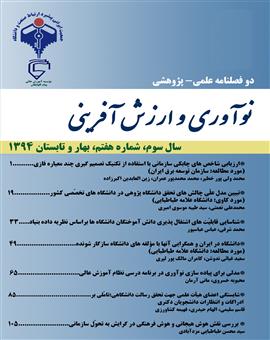بررسی نقش هوش هیجانی و هوش فرهنگی در گرایش به تحول سازمانی
محورهای موضوعی : تخصصی
1 - انجمن علمی اقتصاد شهری ایران
کلید واژه: هوش هیجانی, هوش فرهنگی, تحول سازمانی, مدیران, شهرداری تهران,
چکیده مقاله :
هدف پژوهش حاضر، بررسی نقش هوش هیجانی و هوش فرهنگی در گرایش به تحول سازمانی مدیران شهرداری تهران است. این پژوهش، مطالعهای توصیفی- همبستگی میباشد که به بررسی گرایش به تحول سازمانی، براساس دو متغیر هوش هیجانی و هوش فرهنگی پرداخته است. جامعه پژوهش 144 نفر از مدیران مناطق شهرداری تهران در سال 1393 است که با روش نمونهگیری تصادفی ساده 105 نفر انتخاب شدند. جهت گردآوری دادهها از آزمون هوش هیجانی گُلمن با 33 سؤال، پرسشنامه هوش فرهنگی آنگ و همکاران با 20 سؤال و پرسشنامه چندعاملی رهبری تحولی بس و آوولیو با 20 سؤال استفاده شد. پایایی پرسشنامه هوش هیجانی با ضریب آلفای کرونباخ 88/0، پرسشنامه هوش فرهنگی 86/ 0و پرسشنامه چندعاملی رهبری 78/0 تأیید شد. توصیف و تحلیل دادهها با استفاده از روشهای آماری ضریب همبستگی پیرسون و تحلیل رگرسیون گامبهگام، انجام گردید. نتایج پژوهش نشان میدهد که بین هوش هیجانی و ابعاد آن (خودآگاهی، خودتنظیمی، انگیزش، همدلی و مهارت اجتماعی) با گرایش به تحول سازمانی، همبستگی مثبت و معنادار وجود دارد و از بین ابعاد هوش هیجانی، خودتنظیمی و خودبرانگیختگی، پیشبینی گرایش به تحول سازمانی را دارند. همچنین نتایج پژوهش نشان میدهد که بین هوش فرهنگی و ابعاد آن (فراشناختی، شناختی، انگیزشی و رفتاری) با گرایش به تحول سازمانی همبستگی مثبت و معنادار وجود دارد و از بین ابعاد هوش فرهنگی، هوش فرهنگی شناختی و رفتاری توانایی پیشبینی گرایش به تحول سازمانی را دارند.
The aim of this study was to evaluate the role of emotional intelligence and cultural intelligence in organizational transformation tends of Tehran municipality managers. The research is across Correlation/ Descriptive which survey tend to organizational transformation, based on two variables: emotional intelligence and cultural intelligence. The target population is 144 Tehran municipality managers in 1393 in which 105 people were selected by simple random sampling. For data gathering was used Goleman emotional intelligence test with 33 questions, Ang et, al cultural intelligence questionnaire with 20 items and Multifactor transformational leadership questionnaire for Bass and Avolio with 20 questions. EI reliability Cronbach's alpha coefficient scale 0.88, cultural intelligence 0.86 and multifactor leadership questionnaire was confirmed 0.78. Describe and analyze data using Pearson correlation and stepwise regression analysis was conducted. The results showed that between the dimensions of emotional intelligence (self-awareness, self-regulation, motivation, empathy and social skills) and organizational transformation, there is a significant and positive correlation and between the dimensions of emotional intelligence, self-regulation and self-motivation can forecasting trends to their organizational transformation. Also the results showed that between cultural intelligence and its dimensions (Metacognitive, cognitive, motivational and behavioral) and organizational transformation there is a significant positive correlation and between the dimensions of cultural intelligence, cognitive and behavioral cultural intelligence can anticipate trends to organizational transformation.


